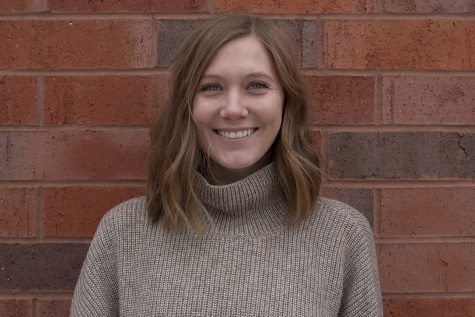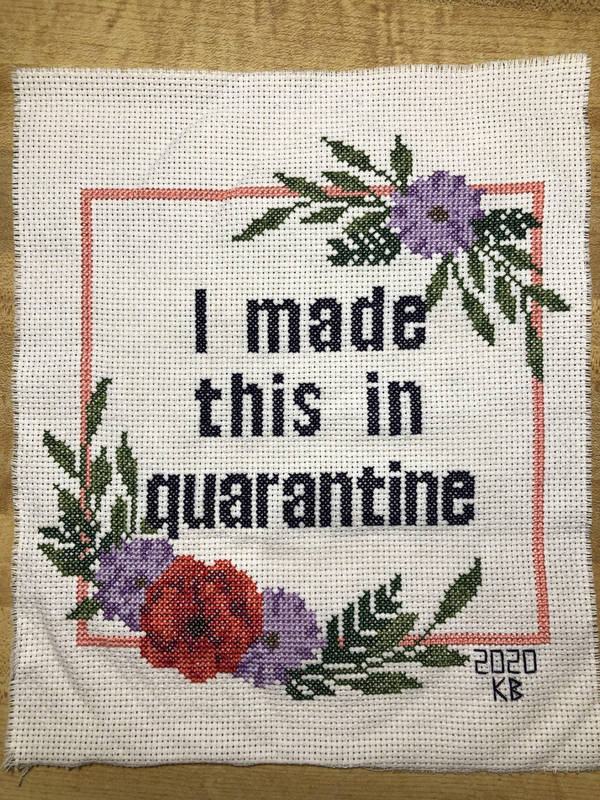The responsibility to preserve
UW-Eau Claire public history students gather materials for Chippewa Valley COVID-19 archive
Photo by Katie Boucher
Jiménez-Frei said anyone in the community is welcome to donate to the archive, just as this handmade cross stitch was donated to the archive by history student Katie Boucher.
Since UW-Eau Claire faculty transitioned to an online format, departments across campus have made the decision to discontinue exhibits and performances from the spring semester.
However, the history department has shifted their approach to upcoming projects, with a new direction and mindset.
Cheryl Jiménez-Frei, an assistant professor of history, made the decision to discontinue an exhibit made by her public history students and create a new project for the course.
She pitched the idea to start a Chippewa Valley COVID-19 digital archive to her students. All of them full-heartedly jumped into the new project, she said.
“Eventually the project came about as a response to what was happening around us,” Jiménez-Frei said. “As historians, we felt a strong responsibility to preserve artifacts of this current moment.”
Jiménez-Frei said she saw this as a learning opportunity for students where they could put their skills toward something meaningful.
The Chippewa Valley COVID-19 archive captures oral history interviews and crowdsourced artifacts across the local community.
Jiménez-Frei said the goal of the archive is to represent a diverse picture of the region.
“We welcome anyone in the community to donate to the archive,” Jiménez-Frei said. “With this pandemic, we have a chance to capture voices that we often do not see in archives.”
Those voices include essential workers, healthcare workers, African American, Latinx, Hmong and Asian American communities, small business owners and many others, she said.
Greg Kocken, the head of special collections and archives at McIntyre Library, said he had started a web archive of news stories even before connecting to Jiménez-Frei.
“News sources are only one perspective of what is happening,” Kocken said. “It is really important that we understand the perspective of the people who are experiencing and living through this moment in history.’’
Kocken said some of the inspiration for the project came from the UW-Eau Claire archives that have a collection of Eau Claire Board of Health records. That collection also includes information about the 1918 Spanish flu pandemic, he said.
“In some ways, there are parallels how the information was presented back then and now,” Kocken said. “But ultimately, we do not have many sources from individuals who share their story and how they were impacted by the pandemic.”
Jiménez-Frei said she is very proud of her public history students for taking on a new project halfway through the semester.
“My students have been very resilient and incredibly motivated,” Jiménez-Frei said. “They were very excited to capture voices that are often left out of the archives.”
Kocken said a project of this scale normally requires months of planning, but they pulled this off in a matter of weeks. It speaks volumes to how quickly UW-Eau Claire students are able to pivot and make this a part of their education, he said.
Erin Hall, a fourth-year public history student, said it is her job as a future public historian to catalogue and preserve this event for future researchers.
“What each person experiences brings something different to the table,” Hall said. “We want to make sure we have someone from all walks of life in the archive.”
Hall said this project gives her and other students field experience in recording the raw emotions and feelings of people who are in the center of the pandemic.
“When things happen, it is important to preserve the memory of what it was actually like,” Hall said. “When we think of history, we don’t think of something that we are currently experiencing, but of something that happened years ago.”
Besides collecting oral histories, Hall said she has been contributing her own personal materials to the archive and plans on preserving homemade fabric masks for her future family.
Kocken said that, as an archivist, he always feels a step removed from what he is documenting, which creates a certain dilemma.
“To be completely honest,’’ Kocken said. “I don’t know if I have come to terms with the fact that I’m both a part of this event and that I have a responsibility to share this story with future generations.”
Jiménez-Frei said it is fascinating how much our daily lives have changed in just two months. Social distancing, self-isolation, quarantine: those are all words of our everyday lexicon, she said.
“It has made me realize how interconnected we all are in so many ways on a global level,” Jiménez-Frei said.
Regarding future plans of the archive, Jiménez-Frei said she plans on continuing this project throughout the summer and taking it into the fall semester.
“I want to continue this project . . . because we don’t know what’s going to continue to happen,” Jiménez-Frei said. “The interviews and the perspectives will be different, so we’ll still be seeing some residual effects of the pandemic.”
Hall said she wants to volunteer and continue working on the archive after graduation. She plans to do follow-up interviews with people to reflect on what they have experienced and how their feelings have changed.
Kocken said as long as COVID-19 is a part of our lives, the project will continue in some capacity.
“Oral histories conducted and items gathered later this year — it’s all a part of this continuing story,” Kocken said.
Jiménez-Frei said the work students are doing is also connected to a larger project. “The Journal of the Plague Year” that began at Arizona State University is a global project that will include the Chippewa Valley’s pandemic stories.
“COVID-19 has affected everyone across the globe in one way or another,” Jiménez-Frei said. “We’re telling these stories not only on a local level, but they are also contributing to global archives.”
Klavina can be reached at [email protected].


